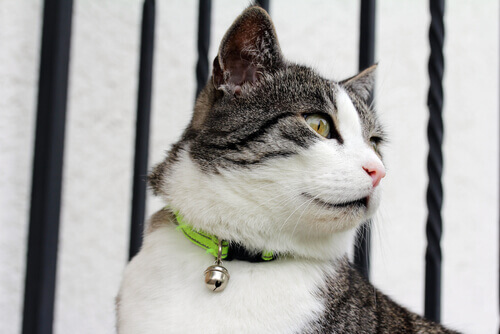3 Benefits of Using a Cat Tracker

Cats are adventurous by nature and will take any opportunity they get to explore outside the home. So, the question is: how can you track them and prevent them from getting lost? The solution is a cat tracker!
These days, a cat tracker has become an indispensable ally for cat owners. It’s a device that lets you track your feline friend when, for whatever reason, it ventures outside the home. Although cat disappearances aren’t too frequent, it can still happen to anyone, and the anguish is unbearable.
Felines are explorers by nature, but they’re also quite skittish. Any contact with unknown stimuli can easily scare them, and may make them flee or take refuge in hard-to-reach places. Because of this, they may well take a long time to return home or, in the worst case scenario, they might not return at all. Keep reading as we tell you more about cat trackers below.
How can you track your cat if they get lost?
Right now, there are several options available to help you locate your cat if they disappear. The first, and most common one, is the ID tag, which allows you to engrave their name and a phone number so that people can call you if they find your cat. It’s a cheap and practical option for your pet.

Another option is the microchip, which collects all the pet’s information and helps it to be traced in case it gets lost or stolen. It’s mandatory in many countries and is considered to be a very effective option. However, with both of these methods, someone needs to find the cat in order to return it to its owner.
Fortunately, technology has helped today’s cat tracker evolve and provide optimal solutions in cases where an animal goes missing. By incorporating GPS (global positioning system), it allows real-time monitoring of the cat’s location, no matter how far away it is.
Benefits of cat trackers
The main benefit of cat trackers is that they tell you exactly where the cat is at any time. However, there are also other advantages worth noting.
1. Safe exploring
As we’ve already mentioned, most cats are rather adventurous. Because of this, they’ll love to explore outdoors whenever they can. With the use of the GPS cat tracker, this will no longer be a problem. Gone will be the anxious feeling of not knowing your cat’s whereabouts. The device will even tell you if the animal is wandering too far away for comfort.
2. Training
With the help of tones and vibrations, the cat tracker, beyond its main function, can also become a training tool. How does it do it? Well, whenever it’s time to eat, or simply whenever you want to call your cat, just send a vibration to the device. Gradually, your cat will get used to this, and will respond to your call.
3. Monitoring of physical activity
Being able to know your cat’s level of physical activity is also important. The technology incorporated in GPS trackers allows you to monitor every activity they do. In this way, you can see when they’re running, walking, playing, or sleeping. You can also keep track of where they spend their time.

How do you use a cat tracker?
Of course, another great advantage of a cat tracker is its ease of use. The device doesn’t need to be inserted under the animal’s skin – you just place it around their neck. It consists of a chip and a receiver that perform the job of tracking your cat and providing all the information. All you need is a smartphone and a data SIM card.
After activating it, you simply have to download the app on Android or IOS and you’ll receive all the information you need on your cat’s location and activity. In general, it has a very good coverage area, and a long battery life. Would you like to try it out? Let us know how you get on!